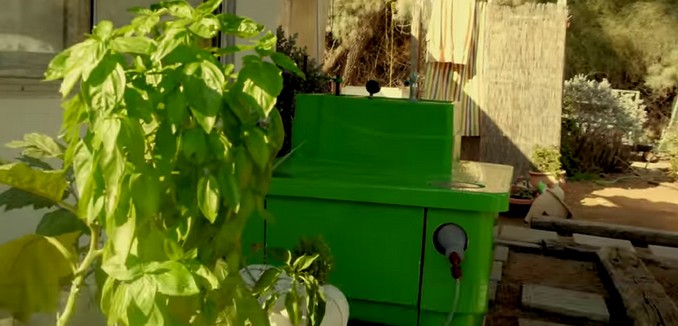When UN Secretary General Ban Ki-Moon visited the sukkah of Israeli President Reuven Rivlin during the Jewish harvest holiday of Sukkot last October, he was treated to a demonstration of a machine the government has given to Bedouin families to convert organic waste into clean bio-gas for cooking, heating, and lighting, as well as organic liquid crop fertilizer.
“He got very excited and told us, ‘Millions of women and children die each year due to indoor smoke from open fires. This is just the thing they need. The UN should be purchasing these units!’” recalled Ami Amir of HomeBioGas, which develops and manufactures a new class of anaerobic biodigesters to convert organic waste to clean renewable energy.
“He asked us to be in touch with the UN’s Food and Agriculture Organization to see where and when our systems could be deployed,” the marketing director tells ISRAEL21c.
The family-size TevaGas (TG) backyard units, available as an easy-to-assemble kit, generate safe energy and fertilizer through bacterial anaerobic digestion of organic waste such as food scraps and animal manure. They provide a sustainable solution for off-grid urban and rural families, as well as environmentally conscious homeowners and small farm owners, in warmer climates.
Last summer, Israel’s Ministry of Environmental Protection purchased and installed TG units at Umm Batin, a Bedouin village near Beersheva without access to clean energy and garbage removal.
Based on the success of a small pilot program, the ministry has ordered another 25 units—at NIS 8,000 apiece—for Umm Batin and another Negev Bedouin village, Amir told ISRAEL21c.
HomeBioGas did not invent household biodigesters, but improved on existing models.
Amir explained that HomeBioGas co-founder Yair Teller traveled to Mexico about eight years ago to observe small bio-gas systems in use there, and went to additional countries to learn more about their operation.
“When he came back to Israel, he wanted to start a similar activity here,” said Amir.
Teller and partner Oshik Efrati acquired bio-gas systems from overseas—primarily China and India—and installed them locally, only to discover they didn’t work well.
Three years ago, the partners were joined by Erez Lanzer and did some market research. They found that about 2.7 billion people live in places without access to clean energy or proper garbage disposal. More than 40 million home bio-gas systems have been installed by governments and aid agencies worldwide, mainly in farming communities. Some 50 million more are expected to be installed by 2020.
However, people often stop using the systems because they’re plagued with efficiency problems, bad odors, and insect infestations.
If the Israelis were to make a go of their enterprise, they clearly had to develop an improved system. Over the next two years, they built prototypes until commercializing TG last summer.
The units, manufactured in Israel, have a built-in grinder for food waste, a tap for rinsing off plates, a sink, and a manual mixer. A bio-filter reduces odors, and a chlorine filter eliminates pathogens in the fertilizer produced. The company, based in Beit Yannai, claims that TevaGas biodigesters can generate enough gas to cook three meals daily, assuming the household “feeds” it all its organic waste.
HomeBioGas works with local distributors that sell, install, and service the TG units.
[ Photo: HomeBiogas / YouTube ]




